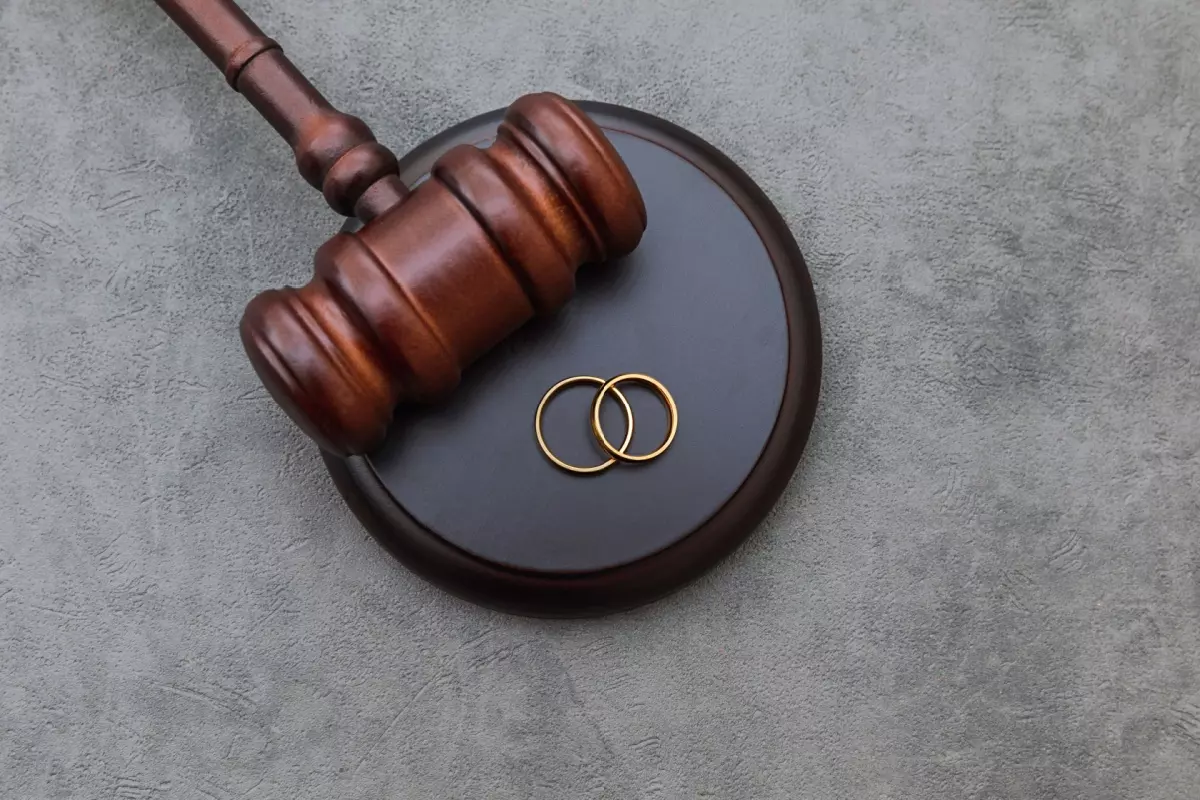Navigating the complexities of a divorce isn’t just about untangling your lives; it’s also about dividing what you’ve built together. A key component of this division is sorting out retirement benefits – a nest egg that both parties have likely contributed to during the marriage.
How do these savings get split? Is it possible to protect your pension in divorce? And does the duration of your marriage influence what you’re entitled to?
Contributions you made to your retirement accounts after saying “I do” are viewed differently than those you made before. And not every state splits these savings down the middle. Whether you live in a community property state or an equitable distribution state, the rules can vary greatly, affecting how much you can claim once everything is settled.
From 401(k) plans and pensions to Social Security benefits, each type of retirement account has its own set of rules for division during divorce proceedings. Keep reading to explore how the length of your marriage could affect your entitlements and what that means for the next chapter of your life.
Legal Framework Governing Division of Retirement Benefits
Navigating a divorce can be challenging, especially when it comes to dividing up what you’ve built together. Retirement funds accumulated during a marriage are typically subject to division between both parties during a divorce. However, the specifics can vary significantly based on state laws and the timing of the contributions.

First, any contributions made to retirement accounts before marriage are generally considered individual property and aren’t divided. In contrast, contributions made after marriage are deemed marital property. This includes funds added to 401(k) plans, pensions, and Social Security benefits. During the divorce proceedings, these contributions are subject to division.
The method of dividing these funds depends heavily on the state in which you file for divorce. Some states are known as community property states. In these locations, all marital property, including post-marriage contributions to retirement accounts, is split equally between both parties.
On the other hand, many states follow equitable distribution rules. Here, the courts strive to divide marital assets fairly but not necessarily equally. Several factors are considered to determine what is fair, such as the duration of the marriage, the financial situation of each spouse, and their future economic prospects.
Marriage Length and Retirement Benefits
When facing divorce, one common question many people have is how long they need to be married to claim a share of their spouse’s retirement savings. It’s natural to worry about your future financial stability during such a trying time.
The simple answer is that there is no set minimum for 401(k) plans and pensions. However, you must be married for at least 10 years to be entitled to a portion of your ex-spouse’s Social Security benefits.
However, the length of your marriage can still play a significant role in dividing pensions and 401(k)s. The longer you are married, the greater the contributions to these retirement accounts during the marriage, and subsequently, the more there is to divide. This means that a longer marriage can result in a larger share of retirement savings for each partner upon divorce.
Specific Rules and Considerations
While each spouse is entitled to a portion of the other’s retirement savings after a divorce, there are specific rules for dividing these funds. Different retirement accounts have their own set of regulations that dictate how they can be split during divorce proceedings.
In the following sections, we will go into more detail about these rules and considerations, giving you a clearer picture of what to expect and how to prepare.
401(k) Plans and Pensions
There are several ways 401(k) and pensions can be divided. The easiest option is for the spouses to negotiate amongst themselves with the help of their attorneys and come to a mutually beneficial agreement.

However, this is often easier said than done. The other option is to let the court make the decision. Courts will apply the respective state’s law. In community property states, these accounts are usually divided equally. In equitable distribution states, the division is based on what the court considers fair, which may not always mean a 50/50 split.
Once a decision is reached, either by the spouses or the court, a Qualified Domestic Relations Order (QDRO) is required to actually transfer the funds from one account to another. The QDRO allows for the funds to be transferred between retirement accounts without triggering early withdrawal penalties and ensures that tax benefits are preserved. This means the receiving spouse can continue to grow their retirement savings tax-deferred.
Social Security Benefits
Unlike 401(k) and pension splits, you must be married for a minimum of 10 years to be eligible for a portion of your ex-spouse’s Social Security benefits. There are additional requirements you must meet to also be entitled to a portion, including:
- You must be at least 62 years old
- You must not be currently married
- Your ex-spouse must receive a larger sum from their Social Security benefits than you receive individually
If you meet these requirements, you will be eligible to receive up to 50% of your ex-spouse’s Social Security benefits.

Here’s how it works: If the benefit you are entitled to receive based on your own work history is less than 50% of your ex-spouse’s benefit, Social Security will make up the difference.
For example, if your own monthly benefit is $800 and 50% of your ex-spouse’s benefit is $1,000, Social Security would pay you $200 extra, so you receive a total of $1,000.
This will not affect the amount your ex-spouse receives – they will continue to get their full Social Security amount regardless of your split.
Final Thoughts: Retirement and Divorce
Figuring out what benefits you are entitled to as you exit your marriage requires a clear understanding of legal frameworks and the role of the marriage’s duration. With this knowledge, you can make informed decisions, ensuring financial stability and security during life’s more difficult transitions.
FAQ
When dealing with a complex situation like retirement and divorce, it’s understandable that you might have some outstanding questions. Here’s some clarification:
How Long Do You Have to Be Married to Get a 401(k) in Divorce?
There is no set time you have to be married to get a share of a 401(k). You may be entitled to a portion of the funds that were contributed during the marriage.
How Long Does It Take to Get a 401(k) After Divorce?
The time it takes to get a portion of the 401(k) after a divorce isn’t fixed to a specific timeframe.
First, it depends on how quickly the parties or the court reach an agreement on how the funds will be split. Then, it varies how long it takes the court to complete the QDRO and transfer it to the plan administrator. Finally, it depends on how quickly the plan administrator processes the transfer.
Ultimately, it could take several months to a couple of years.
Can a Spouse Get Half of 401(k) in Divorce?
In a divorce, a spouse can potentially receive up to half of the 401(k) or even a different percentage. The amount will depend on your state’s laws. For community property states, all marital property will be split 50/50.
For equitable distribution states, the court will determine a fair split, which could range from less than 50% to a larger sum.
How Long Do You Have to Be Married to Get Half of Everything?
The concept of getting “half of everything” in a divorce doesn’t strictly depend on how long you’ve been married. Asset division is based on state laws – community property states might lean towards splitting marital assets equally, while equitable distribution states divide assets fairly, but not always equally.
Do You Have to Be Married for 10 Consecutive Years to Collect Social Security?
Yes, to collect Social Security benefits based on an ex-spouse’s record, the marriage must last a minimum of 10 years. This duration requirement is strict; even if the total time married is 10 years but includes a break, it does not meet the criteria.
How Long Do You Have to Be Married to Get Widow’s Social Security?
To qualify for a widow’s Social Security benefits, officially called Survivorship Benefits, you generally need to have been married to the deceased spouse for at least nine months before their death. Surviving spouses who are at least 60 years old, or 50 if disabled, are eligible. If you were divorced prior to the passing, you must have been married for at least 10 years to qualify.
Can a Prenuptial or Postnuptial Agreement Affect the Division of Retirement Benefits?
Yes, both prenuptial and postnuptial agreements can significantly influence the division of retirement benefits during a divorce. These agreements allow couples to outline how assets, including retirement benefits, should be handled if the marriage ends.
If the agreement includes specific provisions regarding retirement accounts, those terms generally take precedence over state divorce laws. This means that if a prenuptial or postnuptial agreement states that certain retirement funds are to remain with one spouse, that arrangement will typically be honored, barring any issues with the validity or enforcement of the agreement itself.
What Happens to My Retirement Benefits if My Ex-Spouse Hasn’t Started Collecting Them Yet?
If your spouse has retirement benefits but hasn’t started collecting them yet, these assets are still divided during a divorce. This applies even if the benefits have not yet been accessed, such as pensions that are payable in the future or 401(k) accounts that haven’t been drawn upon. Typically, a court or a negotiated agreement will determine how these assets are divided, often using a Qualified Domestic Relations Order (QDRO) to allocate shares legally and ensure they are transferred without penalty.
James Miller is a Senior Content Writer at McGruff.com. He has a background in investing and has spent most of his career in the financial industry. He can trace his family tree back to the California Gold Rush when his ancestors risked it all to make it big in the west. He feels like he's following in their footsteps as he strives to make sense of today's gold market.
